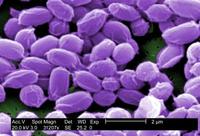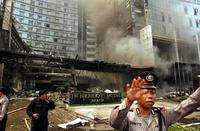-
Algeria agreed to join military campaign to oust Mali Islamic militants
Secretary of State Hillary Rodham Clinton on Monday met with Algeria’s president Abdelaziz Bouteflika, seeking Algeria’s support for an emerging international effort to evict Islamic militants out of northern Mali; Algeria has the region’s strongest military, a highly regarded intelligence service, a long border with Mali, and experience in fighting, and defeating, Islamic militants; the UN Security Council declared its “readiness” to send an international force to evict the militants
-
-
Millennium plot terrorist sentenced to thirty-seven years
Ahmed Ressam, an Algerian native who set up a plot to blow up the Los Angeles airport in December 1999 in what came to be called the “millennium plot,” was sentenced to thirty-seven years in prison on Wednesday; Ressam was arrested in December 1999 when a customs agent noticed him as he drove off a ferry from Canada onto Washington’s Olympic Peninsula; when authorities stopped Ressam and searched his truck, they found large quantity of explosives, and he was captured after a brief chase
-
-
Israeli planes destroy Sudanese arms factory suspected of producing chemical weapons for Hamas
Earlier this morning Israeli planes destroyed the Yarmouk arms factory in Khartoum, Sudan’s capital – 1,300 miles from Israel; in 1998 the plant was suspected of holding Iraqi chemical weapons which Saddam Hussein wanted to conceal from the UN inspectors; Sudan has become a major corridor of arms for Hamas, and Israel has conducted several military operations inside Sudan aiming to disrupt shipments of arms to Hamas; in April 2011 Israeli special forces, ferried by helicopters into Sudan, ambushed and killed two high-level Hamas officials who were on their way to Libya to finalize a deal, financed by Iran, to buy about 800 chemical munitions from anti-Qaddafi rebels who had taken over a couple of chemical weapons depots from the pro-Qaddafi forces
-
-
Jordan foils al Qaeda terror plot against Western embassies, shopping centers

Jordan said its security services have arrested eleven militants who have planned attacks on Western diplomatic missions, shopping malls, and other targets in the capital Amman; this was the first terror plot is to be uncovered in Jordan since an al Qaeda bombing attack on three hotels in Amman almost seven years ago killed sixty people
-
-
Hezbollah drone represents changing technological landscape for Israel
Israel’s air defenses worked just fine in handling the drone launched by Hezbollah last week: the drone was picked up by Israeli surveillance as it was launched from southern Lebanon, then tracked as it flew south over the Mediterranean; it was allowed to enter Israeli air space so that after it was shot down, its remains could be collected and analyzed; still, the incident made many Israelis sit up and take notice; Israel, a country which has pioneered the use of UAVs as an integral part of military operations and which has held a monopoly on operating drones in the region, was forced to realize that is adversaries, too, now had access to the technology
-
-
Researchers find anthrax can grow and reproduce in soil

Anthrax has the unexpected ability to grow and reproduce while lurking in soil — increasing the deadly bacteria’s chances to infect cattle and other mammals; researchers have found that the spores can attack a common soil and water amoeba, Acanthamoeba castellanii, turning these single-celled organisms into anthrax incubators
-
-
Bangladeshi national arrested for trying to blow up the Federal Reserve Bank
A 21-year-old Bangladeshi national, Quazi Mohammad Rezwanul Ahsan Nafis, was arrested by FBI agents after he attempted to detonate what he believed was a 1,000-pound bomb in front of the Federal Reserve Bank building on Liberty Street, Manhattan; the device, however, was a fake provided to him by undercover FBI agents who had been tracking his activity, the FBI’s Joint Terrorism Task Force said Wednesday afternoon
-
-
U.S. to help Libya create an elite anti-terror force

The Obama administration has received a tacit Congressional approval to reallocate about $8 million from Pentagon operations and counterterrorism aid budgeted for Pakistan to Libya, for the purpose of building an elite Libyan force over the next year – a force that could ultimately rise to about 500 troops; the post-Qaddafi Libyan government does not have meaningful military and law enforcement forces at its command. Instead, it relies on several armed militias to maintain law and order in different parts of the country
-
-
Different technologies aim to replace dogs as explosives detectors
Bomb-sniffing dogs are the best and most popular way for airport security quickly to detect anyone planning to bring explosives to an airport; scientists are trying to change that; Dr. Denis Spitzer and his colleagues, for example, are working on a sensor that will detect vapors of TNT and other explosives in very faint amounts; the device they are trying to create would replace dogs as the top bomb detecting method in the field
-
-
Clinton says she was responsible for consulate security
Secretary of State Hillary Clinton said Monday night that she bore the ultimate responsibility for the security of U.S. diplomatic facilities around the world, and as such was responsible for any security failures that were exposed by the 11 September 2012 attack on the U.S. consulate in Benghazi; Clinton said, however, that the administration’s evolving story about what exactly happened at the consulate was attributable to “the confusion you get in any type of combat situation”
-
-
France intensifies campaign against domestic terrorism
In the wake of police raids in several cities in France, French prosecutors said that an Islamist terror cell was planning the biggest bomb attack on France since the mid-1990s; French police arrested twelve people in raids over the weekend; in one of the raids, a gun-wielding suspect was shot and killed; a French prosecutor said the explosive ingredients found garage in the Paris suburb of Torcy on Tuesday night could have made “exactly the same kind of device as was used in 1995 by the GIA” (the Algerian Islamist group exploded a bomb in the Paris Metro which killed eight people and injured 100); Francois Hollande has said that there will be “total mobilization of the state to fight all terrorist threats”
-
-
Terrorism in Indonesia is on the rise, with different targets

The terrorist attacks at two Bali nightclubs in 2002 killed 202 people and wounded another 240; in the ten years since, Indonesia has gained international praise for its counterterrorism efforts; data reveal, however, that more than 700 militants have been arrested over the past ten years, including eighty-four last year; dozens more have been killed since the Bali bombings; rather than attack Western tourists, Islamic militants now attack the Indonesian government and its agencies
-
-
Turkey intercepts a Syrian plane carrying arms from Russia
Tensions between Turkey and Syria continue to escalate, and yesterday Turkish planes forced a Syrian Airbus A320 passenger plane en route from Moscow to Damascus to land in Ankara after Turkish intelligence found that the plane was carrying armament and military equipment Russia was sending the besieged Assad regime; Turkey appears set to create a security zone inside Syria, which will be covered by a no-fly umbrella enforced by the Turkish air force; the no-fly measure would then be extended to the entire Syrian air space, preventing the Assad regime from using its air force to target the opposition, and preventing Iran from air-lifting military supplies to aid the regime
-
-
Rancorous congressional hearings on Benghazi attack marked by partisan rift
The House Committee on Oversight and Government Reform yesterday held hearings on the events surrounding the 11 September attack on the U.S. consulate in Benghazi, and the subsequent handling by the State Department of information released to the public; the hearings were marked by rancor and bitter political acrimony, with Democrats on the committee charging the Republican majority with political grandstanding
-
-
New Jersey “Texting against Terror” program a success
A $5.8 million federally funded program allowing New Jersey Transit commuters to “text against terror” has received 307 tips to the agency since the program started in June 2011; of those 307 messages, seventy-one have “referred to something regarding homeland security,” said Christopher Trucillo, chief of N.J. Transit Police
-
More headlines
The long view
How Male Grievance Fuels Radicalization and Extremist Violence
Social extremism is evolving in reach and form. While traditional racial supremacy ideologies remain, contemporary movements are now often fueled by something more personal and emotionally resonant: male grievance.
